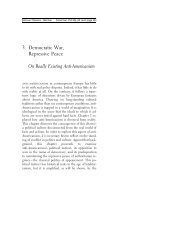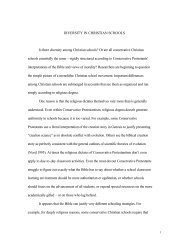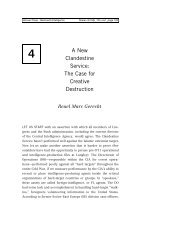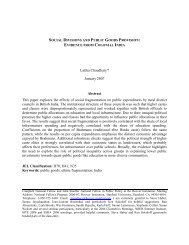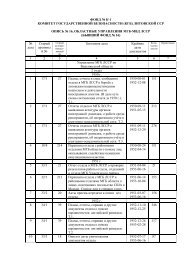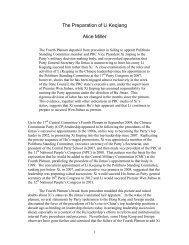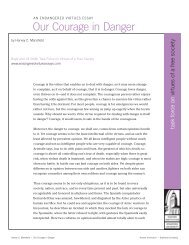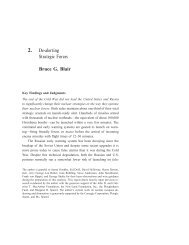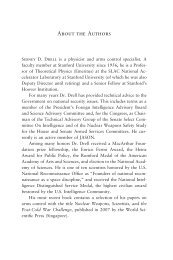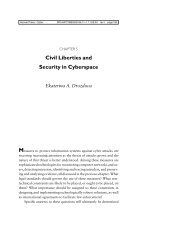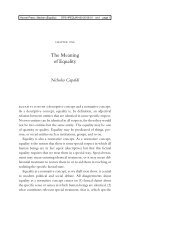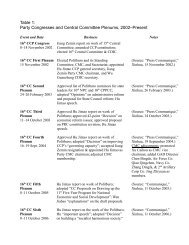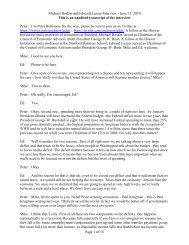HOOVER INSTITUTION 2010 Report
HOOVER INSTITUTION 2010 Report
HOOVER INSTITUTION 2010 Report
You also want an ePaper? Increase the reach of your titles
YUMPU automatically turns print PDFs into web optimized ePapers that Google loves.
<strong>HOOVER</strong> <strong>INSTITUTION</strong> <strong>2010</strong> <strong>Report</strong><br />
ideas defining a free society Hoover Institution, Stanford University
mission<br />
statement<br />
The mission statement of the Hoover Institution, authored by Herbert Hoover<br />
on the purpose and scope of the Institution, continues to guide and define the<br />
Institution in the twenty-first century:<br />
This Institution supports the Constitution of the United States, its Bill of Rights and<br />
its method of representative government. Both our social and economic systems are<br />
based on private enterprise from which springs initiative and ingenuity. . . . Ours is a<br />
system where the Federal Government should undertake no governmental, social or<br />
economic action, except where local government, or the people, cannot undertake it<br />
for themselves. . . . The overall mission of this Institution is, from its records, to<br />
recall the voice of experience against the making of war, and by the study of these<br />
records and their publication, to recall man’s endeavors to make and preserve peace,<br />
and to sustain for America the safeguards of the American way of life. This Institution<br />
is not, and must not be, a mere library. But with these purposes as its goal, the<br />
Institution itself must constantly and dynamically point the road to peace, to personal<br />
freedom, and to the safeguards of the American system.<br />
The principles of individual, economic, and political freedom; private enterprise;<br />
and representative government were fundamental to the vision of the Institution’s<br />
founder. By collecting knowledge, generating ideas, and disseminating both, the<br />
Institution seeks to secure and safeguard peace, improve the human condition, and<br />
limit government intrusion into the lives of individuals.<br />
Mission Statement<br />
1
letter from…<br />
John Raisian<br />
Tad and Dianne Taube Director,<br />
Hoover Institution<br />
2 Letter from John Raisian and Herbert M. Dwight<br />
The policy world in which the Hoover Institution works is experiencing major<br />
changes, so much so that many refer to the shakeout as “the new normal.”<br />
Despite massive federal intervention, accompanied by unprecedented<br />
government debt, the economy has remained sluggish, with many states and<br />
cities on the verge of insolvency. Major wars continue in Afghanistan and Iraq,<br />
with growing concern over the nuclear capabilities of rogue states such as Iran<br />
and North Korea. Health care reform—arguably the most sweeping change of<br />
domestic law in forty-five years—was enacted, yet it remains under challenge<br />
in Congress and the courts. The elections of November <strong>2010</strong> brought their own<br />
changes, as will the new Congress.<br />
Through its research and analysis, the Hoover Institution has provided the<br />
intellectual foundation for much of the policy debate, prompting and<br />
encouraging some policies, while questioning and challenging others. Indeed,<br />
the several task forces and working groups Hoover assembled just a few<br />
years ago have foreshadowed the very issues we now face: Islamism, national<br />
security and law, education reform, the economy, health care and others. As<br />
the New York Times recently observed, Hoover scholars “are in demand by<br />
journalists and Congressional aides.”<br />
Rapid changes in policy are enabled by new tools of communication, and Hoover<br />
has worked diligently to find its place in the new media and social media worlds.<br />
Hoover scholars have learned to deliver timely messages through short books,<br />
blogs, Twitter, and Facebook, while also increasing their visibility in traditional<br />
media through op-eds and interviews. In most measurable categories, Hoover’s<br />
communications output has increased by 100 percent or more in the past year.
So, too, has the world of libraries and archives changed. While Hoover continues<br />
its active collecting and archiving of important documents, new technologies<br />
have created a demand for digitizing and disseminating materials. Hoover now<br />
sells political posters online and DVDs through Amazon, while continuing to<br />
host scholars from around the world in its reading rooms.<br />
We join in thanking David Traitel, who recently completed a successful term<br />
as chairman of the Board of Overseers of the Hoover Institution. In the face of<br />
budgetary challenges, Hoover has wisely managed its resources and maintained<br />
its momentum. We, along with the broader Hoover team of overseers and<br />
directors, look forward to increasing the impact of the important work of the<br />
Hoover Institution and its scholars.<br />
John Raisian Herbert M. Dwight<br />
Herbert M. Dwight<br />
Chairman, Board of Overseers,<br />
Hoover Institution<br />
Letter from John Raisian and Herbert M. Dwight<br />
3
institutional and<br />
individual research<br />
4 Institutional and Individual Research
Fundamental to the Hoover Institution’s mission are the<br />
principles of individual, economic, and political freedom;<br />
private enterprise; and representative government. By<br />
collecting knowledge, generating ideas, and disseminating<br />
both, the Institution seeks to secure and safeguard peace,<br />
improve the human condition, and limit government<br />
intrusion into the lives of individuals.<br />
The Hoover Institution stands out with its assemblage of exceptional intellectual<br />
talent in matters of public policy within one of the world’s leading research and<br />
teaching institutions, Stanford University.<br />
Hoover prides itself on having the perspectives of both analytic scholarship<br />
and historical knowledge. The scholars at Hoover specialize in generating ideas<br />
defining a free society and in educating, as well as spreading those ideas widely<br />
to a broad and interested public, including government leaders, the media,<br />
and other members of the intelligentsia about public policies pertaining to<br />
peace and prosperity. Currently engaged in both high-quality and high-quantity<br />
research, Hoover scholars regularly participate in various ongoing public policy<br />
dialogues, including appearing on television and radio programs and testifying at<br />
government hearings, as well as producing an impressive body of books, op-eds<br />
and articles, research papers and essays, and web-based writings.<br />
To fulfill the Institution’s objectives of contributing to the public debate and<br />
speaking to policies that will chart a course toward national prosperity and<br />
security, Hoover convenes the best available minds to analyze society’s most<br />
challenging problems so as to inform both the national leadership and the<br />
society at large. The strength of Hoover’s research programs lies in our fellows,<br />
who strive to address the “big picture,” offering ideas having broad, sweeping<br />
applications and internally consistent implications.<br />
A number of prestigious awards and honors have been bestowed on Hoover<br />
fellows throughout the years, including such accolades as the Nobel Prize, the<br />
National Medal of Science, the Presidential Medal of Freedom, the National<br />
Humanities Medal, and the Bradley Prize. In addition, many Hoover fellows are<br />
involved in a number of honor societies, including the American Academy of Arts<br />
and Sciences, American Philosophical Society, Econometric Society, National<br />
Academy of Education, and National Academy of Sciences.<br />
Institutional and Individual Research<br />
5
2008 Highlights<br />
6 Institutional and Individual Research<br />
At the Hoover Institution exceptional ideas are applied to current issues, with novel<br />
applications that utilize the unique strengths of our fellows to make an impact on<br />
today’s policy discussions. As Thomas Jefferson said, “eternal vigilance is the price<br />
of liberty.” Thus, Hoover will continue to apply its thinking, based on long-standing<br />
principles, to adapt to changing societal circumstances.<br />
WORKING GROUPS AND TASK FORCES<br />
During the years, Hoover fellows have focused their research and writing on a<br />
breadth of topics that includes individual freedom and the rule of law, American<br />
individualism and societal values, democratic capitalism and economic/political<br />
collectivism, as well as national priorities and international rivalries/global<br />
cooperation. The Institution also aggressively pursues policies that seek to enhance<br />
economic prosperity, fiscal integrity, educational excellence, and national security.<br />
Embracing these themes, in recent years the Institution has developed a research<br />
methodology that synthesizes current thinking, offers new perspectives, and<br />
conveys the results to a broad constituency. The ten scholarly teams—working<br />
groups and task forces—were designed to focus on prevailing policy issues<br />
within the Institution’s research priorities and thus engage the national dialogue.<br />
1 2 3<br />
1. April 8, 2008: A Conversation on America and Europe Conference Stephen Krasner (center),<br />
senior fellow at the Hoover Institution, offers comments at the “A Conversation on America and Europe:<br />
Common Interests and Uncommon Challenges Conference."<br />
2. June 4, 2008: Gary Becker and 3. Victor Davis Hanson, 2008 Bradley Prize Winners<br />
In June 2008, the Lynde and Harry Bradley Foundation awarded two of its four 2008 Bradley Prizes to<br />
Gary Becker, the Rose-Marie and Jack Anderson Senior Fellow, and Victor Davis Hanson, the Martin and<br />
Illie Anderson Senior Fellow at the Hoover Institution. The Bradley Prizes, awarded annually, are given to<br />
prominent scholars and engaged citizens for outstanding achievement. Photos provided by the Lynde and<br />
Harry Bradley Foundation.
4<br />
Leveraging the scholarly and administrative assets already in place at Hoover,<br />
these teams are organized as “virtual faculties,” consisting of Hoover fellows and<br />
scholars from Stanford University, as well as other leading universities and research<br />
organizations, all of whom work on jointly defined topics and projects.<br />
The ten teams examine the economic, political, legal, and historical dimensions of<br />
a broad set of policy issues. Three teams are based on academic disciplines, mainly<br />
economics, politics and law, and history. Three teams specifically focus on health<br />
care, energy, and education. Two additional teams are concerned with radicalism<br />
in cultures different from our own, national security issues, and a new international<br />
order in the aftermath of 9/11. The remaining two teams focus on the foundations of<br />
our nation pertaining to property rights and the virtues of a free society in relation<br />
to our distinctly American way of life.<br />
The teams are formed and engaged, with each having a role to play at a critical<br />
juncture in the American experience. The flow of books, essays, op-eds, blogs,<br />
testimony, media appearances, and other writings is at an all-time high. Since 2007,<br />
when many of these teams were launched, nearly forty books and essays have been<br />
published by group members, with another forty projects expected to be completed<br />
in the coming two years.<br />
4. September 8, 2008: Sophomore College Students Meet with John Raisian Stanford’s<br />
Sophomore College, a program that allows Stanford students to explore topics of interest and develop<br />
lines of communication with Stanford faculty, met with John Raisian (left), the Tad and Dianne Taube Director,<br />
and Richard Sousa (third from right), the senior associate director of library and archives, to discuss<br />
public policy issues and the role Hoover plays at Stanford.<br />
Institutional and Individual Research<br />
7
2008 Highlights<br />
8 Institutional and Individual Research<br />
Working Groups and Task Force Descriptions<br />
Critical Junctures in American Government and Politics<br />
examines the governmental and political changes set in motion by the 2008 elections.<br />
Political scientists and historians assess the unfolding policy agendas of the<br />
legislative process, the politics of policy, and the growth of the administrative state.<br />
Working Group on Economic Policy conducts research on current<br />
financial conditions as well as prevailing economic policies and issues, including<br />
domestic and global monetary, fiscal, and regulatory policies. Ideas exploring the<br />
market and government dimensions of solutions are promoted when the goal is<br />
increasing the extent and breadth of national and global prosperity.<br />
Shultz-Stephenson Task Force on Energy Policy gathers<br />
comprehensive information on current scientific and technological developments<br />
in energy production, distribution, and use. Findings inform and guide policy<br />
prescriptions that address the economic, environmental, and national security<br />
threats of foreign oil dependence, taking into account cost, competitiveness, and<br />
marketplace efficiency.<br />
1 2<br />
1. November 11, 2008: Homeland Security Michael Chertoff (right), secretary of homeland security,<br />
pictured with Director John Raisian, met with Hoover Institution fellows to discuss cybersecurity.<br />
2. November 12, 2008: Hoover Hosts Roundtable Discussion United States Army general John<br />
Craddock, commander, United States European Command, and supreme allied commander, Europe, for<br />
NATO, visited the Hoover Institution as a guest of honor at a roundtable discussion with Hoover fellows.
3<br />
Working Group on Health Care Policy devises public policies that<br />
enable more Americans to get better value for their health care dollar and foster<br />
appropriate innovation that extends and improves life. Key principles that guide<br />
policy formation include the central role of individual choice and competitive<br />
markets in financing and delivering health services, individual responsibility<br />
for health behaviors and decisions, and appropriate guidelines for government<br />
intervention in health care markets.<br />
Herbert and Jane Dwight Working Group on Islamism and the<br />
International Order seeks to reverse Islamic radicalism through reforming<br />
and strengthening the legitimate role of the state across the entire Muslim world.<br />
Efforts draw on the intellectual resources of an array of scholars and practitioners,<br />
from within the United States and abroad, to foster the pursuit of modernity, human<br />
flourishing, and the rule of law and reason in Islamic lands—developments that are<br />
critical to the order of the international system.<br />
continued…<br />
3. November 14, 2008: Romanian Ambassador Visits the Hoover Institution Hoover Institution<br />
associate archivist Brad Bauer (far right) describes historic material from the Institution’s collections on<br />
Romania to Romanian ambassador to the United States Adrian Vierita (center) and his wife, Codrina Vierita.<br />
4. December 12, 2008: Reykjavik Revisited: Steps toward a World Free of Nuclear Weapons<br />
Book Launch Senior fellow Sidney Drell (left), and James Goodby, research fellow and former US<br />
ambassador, discussed the threat of nuclear weapons and possible solutions at the event.<br />
4<br />
Institutional and Individual Research<br />
9
2009 Highlights<br />
10 Institutional and Individual Research<br />
Koret Task Force on K–12 Education conducts policy research on<br />
educational improvement, examining measures to reform public schools and<br />
expand privatization. The reforms focus on accountability and transparency,<br />
in terms of both student performance and fiscal responsibility. Privatization<br />
stresses choice—for parents, teachers, and school administrators—including the<br />
consideration of charter schools and vouchers. Both dimensions of reform carefully<br />
weigh equity concerns.<br />
Koret-Taube Task Force on National Security and Law examines<br />
the rule of law and its importance in Western civilization, as well as international law<br />
and organizations, the laws of war, and US criminal law. By studying the array of legal,<br />
social, economic, ethical, and political factors, the group aims to strike an optimal<br />
balance between individual freedom and the vigorous defense of the nation against<br />
terrorists both at home and abroad.<br />
John and Jean De Nault Task Force on Property Rights,<br />
Freedom, and Prosperity explores the philosophical, historical, legal, and<br />
economic foundations of property rights and their role in contemporary society.<br />
1 2<br />
1. January 2009: Senior Fellows at the Hoover Institution Victor Davis Hanson (left) and Shelby<br />
Steele, the Robert J. and Marion E. Oster Senior Fellow, share a light moment at a Hoover Institution event.<br />
2. January 23, 2009: Hoover Hosts Roundtable Discussion Director John Raisian (left) and Elliott<br />
Abrams, former deputy assistant to the president and former deputy national security adviser for global<br />
democracy strategy, participate in a roundtable discussion about the Middle East and Israeli/Palestinian issues.
The inquiry stresses how secure property rights encourage economic development,<br />
natural resource stewardship, and investment in intellectual and physical capital, as<br />
well as promote individual responsibility, liberty, and prosperity.<br />
The Role of History in Policy Formation critiques contemporary<br />
societies’ tendency to address public policy issues with minimal reference to the<br />
historical record. The perspective of history plays an important role in sorting<br />
through policy alternatives by informing and shaping the analytic dialogue. This<br />
approach will first be applied to understanding the link between military history<br />
and current national security issues, including the conduct of war and our response<br />
to terrorism.<br />
Boyd and Jill Smith Task Force on Virtues of a Free Society<br />
aims to clarify the beliefs, practices, and institutions that play a crucial role in<br />
forming and sustaining liberty, democratic self-government, and the American<br />
way of life. By examining political thought and culture, the transformation of<br />
government and society, and changes in American public opinion, the group will<br />
formulate recommendations for strengthening our civil society.<br />
3 4<br />
3. March 30, 2009: Workshop on the Future of Central Banking George P. Shultz (right), the<br />
Thomas W. and Susan B. Ford Distinguished Fellow at the Hoover Institution, opened the one-day policy<br />
workshop with an address encouraging participants to “think long” and consider future implications as they<br />
address urgent policy challenges. Shultz is pictured here with Allan Meltzer of Carnegie Mellon University<br />
during a break from the conference.<br />
4. April 24, 2009: Discussion on Worldwide Economics The Honorable John Howard, former prime<br />
minister of Australia, discusses the broad implications of the worldwide economic plunge at a meeting with<br />
Hoover Institution fellows and Stanford faculty at the Hoover Institution.<br />
Institutional and Individual Research<br />
11
12 Institutional and Individual Research<br />
Terrorism and National Security<br />
For decades, the themes of the Hoover Institution have revolved around<br />
the broad concerns of political, economic, and intellectual freedom. No sooner<br />
had communism and the cold war left the stage than they were replaced by the<br />
shocking events leading up to and following the attacks of September 11, 2001.<br />
Two concentrated areas of research have evolved during the past few years that<br />
focus on the modern international order of states. In thinking about international<br />
order, national security issues, in the face of terrorism and ideological strife, are<br />
paramount. Some fear that privacy is eroding under the guise of national security<br />
requirements that seek only to replace outdated conventions of the laws of war<br />
with the classical rule of civilian law. Hoover scholars continue to contribute to the<br />
ongoing dialogue on topics such as the ongoing security issues in the United States<br />
and abroad so as to further our understanding of the war of ideas with radical Islam<br />
and its links to terrorism. Numerous treatments have been written on such topics,<br />
including<br />
Jack Goldsmith’s The Terror Presidency: Law and Judgment inside the Bush<br />
Administration<br />
Zeno Baran’s Torn Country: Turkey between Secularism and Islamism<br />
Abbas Milani’s The Myth of the Great Satan: A New Look at America’s Relations<br />
with Iran<br />
Habib Malik’s Islamism and the Future of the Christians of the Middle East<br />
Stewart Baker’s Skating on Stilts: Why We Aren’t Stopping Tomorrow’s Terrorism<br />
Russell Berman’s Freedom or Terror: Europe Faces Jihad
Economy<br />
Since the beginning of the financial crisis, Hoover fellows have<br />
been actively engaged in research and debate on the causes of and solutions to<br />
the problems. Their efforts, which focus on various aspects of the economic crisis,<br />
are disseminated in an array of mediums, including opinion editorials and articles,<br />
lectures, media appearances, governmental testimony, and short books. Books that<br />
have been published include Getting Off Track, The Road ahead for the Fed, and<br />
Ending Government Bailouts as We Know Them, which were led by the efforts of<br />
John B. Taylor. These three books examine the causes of the financial crisis and what<br />
prolonged and worsened it, the proposals for financial reform and exit strategies,<br />
and the dangers of continuing government bailouts as well as offering constructive<br />
alternatives. Thomas Sowell authored the book The Housing Boom and Bust that<br />
explores the economics and politics behind the boom and bust. And, to coincide<br />
with the first hundred days of the Obama administration, Terry L. Anderson and<br />
Richard Sousa, along with a team of expert contributors, produced Reacting to the<br />
Spending Spree that analyzes near- and long-term efforts by both the Obama and<br />
the Bush administrations to fix the current financial crisis by examining a range of<br />
issues affected by the proposed reforms.<br />
Institutional and Individual Research<br />
13
14 Retreats<br />
Retreats<br />
At donor retreats, a tradition since 1992, Hoover fellows<br />
and other leading public policy analysts present their latest<br />
research to the Institution’s friends and supporters. Such<br />
retreats showcase Hoover’s many contributions toward<br />
generating public policy: the volunteer military, the intellectual<br />
framework of the Reagan presidency, the flat tax, the Taylor<br />
Rule, choice and accountability in education, and other ideas<br />
central to America’s political culture.
“Even in an era of much-ballyhooed change, the<br />
government cannot eliminate sadness. What it<br />
can do is transfer that sadness from those who<br />
made risky and unwise decisions to the taxpayers<br />
who had nothing to do with their decisions.”<br />
— Thomas Sowell, the Rose and Milton Friedman Senior Fellow on Public Policy<br />
Retreats<br />
15
library and<br />
archives<br />
16 Institutional and Individual Research
The library and archives (L&A) continue robust collecting,<br />
aggressive preservation, extensive outreach, and important<br />
publishing. Researchers access collections in record<br />
numbers, and newly opened high-profile collections draw<br />
the attention of international news media. Despite the<br />
Internet’s making information readily available online, at<br />
the Hoover Archives (one of the largest private archives<br />
in the world) researchers can touch and feel history by<br />
examining documents unavailable anywhere else.<br />
ACQUISITIONS<br />
Collecting in the Middle East increased dramatically when a deposit agreement<br />
was signed with the Iraq Memory Foundation. The documents collected in Iraq<br />
by the foundation consist of records from the Ba’th Regional Command, the<br />
headquarters of the Ba’th Arab Socialist Party, and the Special Security Agency.<br />
The overall collection contains some eleven million digital images and four<br />
hundred hours of video.<br />
The Parviz Shokat Collection contains extensive documentation of Iranian student<br />
groups who opposed the government of the shah of Iran during the 1960s and<br />
1970s. The Hamid Shokat (Parviz’s brother) Collection contains similar material<br />
from Iranian student groups based in Europe during this period. The audio<br />
archive of Hyder Akbar, a young Afghan American who created two award-winning<br />
radio documentaries on life in Afghanistan after the fall of the Taliban, provides<br />
vivid firsthand accounts of life in Afghanistan.<br />
The papers of US Supreme Court chief justice William Rehnquist arrived in 2008.<br />
“The Chief” sat on the bench for thirty-three years, from 1972 to 2005. His records<br />
offer a glimpse of US judicial history that covers a generation of change, turmoil,<br />
and success unmatched by any other epoch.<br />
A project to obtain microfilm of the Lithuanian KGB Archives has produced<br />
more than 1.2 million images containing KGB-generated documents: intelligence<br />
reports, infiltration reports, applications for travel abroad, and reeducation files.<br />
Library and Archives<br />
17
2009 Highlights<br />
18 Library and Archives<br />
Collections gathered from Central Europe shed much light on the fall of communism<br />
in Europe. A momentous event occurred when the Hungarian government allowed<br />
“picnicking” East Germans vacationing in Hungary to cross its border into Austria<br />
and freedom. The Hungarian minister of state who sponsored the so-called picnic<br />
was Imre Pozsgay, whose papers include, in addition to background on the events<br />
of 1989 and Hungary’s peaceful transition to democracy, material on political<br />
developments in Hungary dating back to the 1956 Budapest uprising.<br />
The papers of a number of powerful Polish Communists were also acquired:<br />
Jakub Berman, who rose to the number-two position in the Politburo; Mieczyslaw<br />
Rakowski, the last Communist Party first secretary and a prime minister; Jerzy<br />
Urban, the last spokesman for the Polish communist government, who was<br />
intimately involved in negotiations with Solidarity that led to the 1989 elections;<br />
Stefan Olszowski, foreign minister on two separate occasions in the 1970s and 1980s;<br />
and Marshal Marian Spychalski, one of the organizers and leaders of the Moscow-<br />
oriented underground during World War II and a founder of the Polish People’s<br />
Republic.<br />
For forty-five years, the BBC Radio Russian Features Department interviewed Soviet<br />
defectors, dissidents, and activists (including Andrei Siniavskii, Andrei Sakharov,<br />
Elena Bonner, Stalin’s daughter Svetlana Allilueva, Alexander Solzhenitsyn, and<br />
1 2<br />
1. May 21, 2009: Antiques Roadshow at Hoover The producers of Antiques Roadshow contacted<br />
the Hoover Institution to learn more about the more than 100,000 posters from around the world housed in<br />
the archives and went on to feature Hoover’s huge collection of political posters, specifically discussing<br />
the origins of the iconic images of Uncle Sam. Producers Mark L. Walberg and appraiser Nicholas Lowry<br />
(left) are seen here visiting the archives.<br />
2. June 9, 2009: Estonian President Visits Hoover Archives Toomas Hendrik llves, president of<br />
Estonia, and Evelin llves, first lady of Estonia, listen to a presentation prepared in their honor while visiting<br />
the Hoover Archives.
3<br />
Joseph Brodsky). The archives has acquired the full set of some three thousand<br />
original tapes and digital versions. The audiovisual collections were further<br />
enhanced by film from Richard Wormser, who donated his video interviews with key<br />
US Communist Party figures.<br />
The East Asian Collection added material from General Chien Ta-chun and William<br />
Youngman; both had close ties to Chiang Kai-shek. Chien was an important military<br />
leader; the American Youngman, president of China Defense Supplies, served as an<br />
intermediary between President Roosevelt and Chiang Kai-shek.<br />
For years the Young China Party clashed with Chiang’s Kuomintang (KMT) Party<br />
before cooperating with Chiang to oppose the Japanese and then the Communists.<br />
With the acquisition of the papers of its first chairman and one of its founders, Zeng<br />
Qi (Tseng Ch’i), the history of the Young China Party is now better known.<br />
Chinese poet and dissident Lin Zhao has been lionized for writing poetry and her<br />
diaries in her own blood while imprisoned as a counterrevolutionary by the Chinese<br />
government. After ten years of imprisonment, Lin was executed during the height of<br />
the Cultural Revolution. A select portion of the limited materials that still exist are<br />
now at Hoover.<br />
3. August 6, 2009: Polish Medal Ceremony In a ceremony at the Hoover Institution, Radostaw<br />
Sikorski (left), minister of foreign affairs of Poland, presented the Polish Commander’s Cross of the Order of<br />
Merit to Robert Conquest (right), research fellow, and Director John Raisian (not pictured).<br />
4. August 26, 2009: Russian Ambassador Reviews Collections from Hoover Archives During<br />
a visit to the West Coast, Sergey Kislyak (left), Russian ambassador to the United States, and his wife, Natalia<br />
Kislyak (center), visited the Hoover Institution Library and Archives. Hoover’s Russian curator Anatol Shmelev<br />
(right) points out various items from Hoover’s extensive Russian Collection to the ambassador and his wife.<br />
4<br />
Library and Archives<br />
19
2009 Highlights<br />
1<br />
20 Library and Archives<br />
An increment to the papers of Nobel laureate economist Friedrich von Hayek<br />
included material that spans much of Hayek’s life, including drafts of his work in the<br />
1940s. Because of the recent economic downturn, the timing of these additions is<br />
fortuitous, as <strong>2010</strong> saw a revival of interest in Hayek's teachings.<br />
ACCESS AND OUTREACH<br />
The summers of 2009 and <strong>2010</strong> were the busiest on record in the Institution’s<br />
reading rooms. During a typical summer day, between twenty-five and thirty patrons<br />
made use of materials at Hoover. Annually, more than three thousand researchers<br />
use collections on-site. Among the most popular collections are the Chiang<br />
Kai-shek diaries, records of the Communist Party of the Soviet Union, political<br />
poster collection, Milton Friedman and Hayek papers, Boris Nicolaevsky collection,<br />
KMT records, T. V. Soong and Joseph Stilwell papers, and Radio Free Europe/Radio<br />
Liberty (RFE/RL) recordings.<br />
Finding aids for all of Hoover’s nearly six thousand archival collections are now<br />
available in the Online Archive of California (OAC). The number of page views<br />
of Hoover’s OAC collection increased fourfold between 2009 and <strong>2010</strong>, after that<br />
project was completed.<br />
1. September 18, 2009: Media Colloquium Policy debates within the field of education were the<br />
focus of a media colloquium held at the Hoover Institution. The colloquium, titled “Getting Beneath Current<br />
Educational Policy Debates,” featured presentations by K–12 task force members on a variety of topical<br />
issues.<br />
2. September 22, 2009: Hoover Media Fellows’ Seminar The Bill and Barbara Edwards Media<br />
Fellows Program featured Hoover media fellow Matthew Bai, a New York Times reporter, at a seminar to<br />
discuss “How Baby Boomers Ruined American Politics.”<br />
2
Hoover’s political poster collection contains approximately 120,000 posters from<br />
around the world. Digital images of more than 22,000 posters are available at Hoover<br />
workstations and online. More than 130 DVDs from the Firing Line television series<br />
are on sale at Amazon; some 12,000 DVDs have been sold through this partnership,<br />
with programs featuring Ronald Reagan, Malcolm Muggeridge, and Barry Goldwater<br />
being among the most popular.<br />
There was no more recent successful outreach effort than reaching eight million<br />
viewers of PBS’s Antiques Roadshow on the May 24, <strong>2010</strong>, program. A four-minute<br />
segment featured two posters from the political poster collection including the<br />
iconic “Uncle Sam Wants You” poster.<br />
International friendship between the United States and South Korea was fostered<br />
when, in July <strong>2010</strong>, a copy of Hoover’s Japan Korea microfilm records was<br />
presented to the Republic of Korea’s Ministry of Patriots and Veterans Affairs.<br />
Suffering the effects of poor-quality originals, natural deterioration, and war,<br />
Korea's comprehensive record related to the Japanese occupation in the early<br />
twentieth century was no longer intact. The result of a worldwide search led the<br />
ministry to Hoover to recover the materials that first arrived at Hoover in the<br />
1940s and survive through the Institution’s long-term preservation efforts.<br />
3 4<br />
3. September 29, 2009: Conference on Nuclear Nonproliferation Hosted by George P. Shultz,<br />
“A World without Nuclear Weapons: End State Issues" was held at the Hoover Institution to discuss<br />
the key security challenges facing the United States and other nations as a program of nuclear warhead<br />
reductions unfolds.<br />
4. December 16, 2009: Delegation of the Party Literature Research Center Hoover Institution<br />
research fellow Hsiao-ting Lin (left) shows a delegation from the Party Literature Research Center of the<br />
Chinese Communist Party Central Committee a few of the documents relating to modern China that are<br />
part of Hoover's vast collections.<br />
Library and Archives<br />
21
<strong>2010</strong> Highlights<br />
22 Library and Archives<br />
With many of the originals lost or destroyed, the Hoover Archives holds the most<br />
complete collection of these records.<br />
Major conferences highlighted Hoover’s East Asian Collections. At Fudan University<br />
in Shanghai, leading Chinese scholars examined the impact of the telegram<br />
correspondence between Chiang Kai-shek and T. V. Soong to get a more complete<br />
picture of the complex US–Nationalist China relationship throughout most of the<br />
1940s. The Chiang Kai-shek diaries were the focus of a May <strong>2010</strong> session at an event in<br />
Beijing celebrating the sixtieth anniversary of the creation of the Institute of Modern<br />
History of the Chinese Academy of Social Sciences. At a University of California,<br />
Berkeley, conference on Republican Chinese history, leading scholars discussed their<br />
reading and evaluation of the significance of Hoover’s collections on Modern China.<br />
The scholars also addressed whether Republican history should be rewritten in light<br />
of the new materials now available (primarily the Chiang Kai-shek diaries).<br />
PRESERVATION<br />
By its very nature, preservation work is painstakingly detailed, with the results often<br />
barely perceptible to the end user. Matching the newest equipment with time-tested<br />
techniques yielded significant results.<br />
1 2<br />
1. January 7, <strong>2010</strong>: Marine Corp General Visits the Hoover Institution General James Cartwright,<br />
a four-star Marine Corps general and the vice chairman of the Joint Chiefs of Staff, visits the Hoover Institution<br />
to discuss the Strategic Arms Reduction Treaty and nonproliferation issues with Hoover fellows.<br />
2. January 29, <strong>2010</strong>: Lithuanian Ambassador to the United States Audrius Bruzga (right), Lithuanian<br />
ambassador to the United States, reviews documents from the Hoover Archive’s Lithuanian Collections with<br />
Algis Ratnikas, the treasurer of the San Francisco Bay Area Lithuanian Community.
3<br />
Seven million Iraq Memory Foundation documents in four thousand boxes were<br />
blast-frozen to kill pests, arrest mold and mildew growth, and mitigate other<br />
biological threats. Preservation included wrapping and sealing each of the four<br />
thousand boxes of material in plastic to prevent condensation before the materials<br />
were blast-frozen. The collection is now environmentally stabilized and secure.<br />
Part of the preservation process is the tedious chore of organizing materials and<br />
storing them in safe conditions before undertaking the intensive, specialized work<br />
necessary for long-term preservation. All eighty thousand tapes from the Radio<br />
Free Europe/Radio Liberty (RFE/RL) Collection were rehoused and organized for<br />
preservation. One of the oldest parts of that collection is the Romanian Service,<br />
which includes 324 acetate-backed open-reel tapes. These extremely fragile tapes<br />
were successfully digitized and thus preserved.<br />
The founding meeting of the United Nations was held in San Francisco in 1945. The<br />
official record, documented by NBC, consists of nearly 150 glass- and aluminum-<br />
based lacquer discs, of which only two complete sets remain (one at Hoover and<br />
one at the Library of Congress). Because of their fragile condition, the collection<br />
had been closed. The discs were stabilized and the content digitized; the collection<br />
is now available to researchers.<br />
3. February 1, <strong>2010</strong>: Hoover Institution Hosts Media Colloquium Robert Hall, the Robert<br />
and Carole McNeil Senior Fellow at the Hoover Institution, discusses the state of the economy and the<br />
economic stimulus program.<br />
4. February 22, <strong>2010</strong>: Board of Overseer Greets the Honorable Bill Thomas David Traitel<br />
(left), chairman of the Hoover Institution Board of Overseers, greets the Honorable Bill Thomas, former<br />
member of the U.S. House of Representatives from 1979 to 2007, following a lunch during which Thomas<br />
provided his observations on the 111th Congress.<br />
4<br />
Library and Archives<br />
23
<strong>2010</strong> Highlights<br />
24 Library and Archives<br />
PUBLICATIONS<br />
The <strong>2010</strong> Pulitzer Prize for general nonfiction was awarded to David E. Hoffman<br />
for The Dead Hand: The Untold Story of the Cold War Arms Race and Its Dangerous<br />
Legacy. Using Hoover’s Vitaly Katayev papers as a primary source, Hoffman wrote<br />
that “the Katayev papers were the backbone of this book. . . . I could not have done<br />
this without the Hoover Library and Archives!”<br />
Some of the most used collections also led to the publication of important books.<br />
Jay Taylor, in the past a critic of Chiang Kai-shek, released The Generalissimo: Chiang<br />
Kai-shek and the Struggle for Modern China, in which he paints Chiang in a more<br />
favorable light. Hoover fellow Paul Gregory used the papers of the Communist Party<br />
of the Soviet Union to write Lenin’s Brain and Other Tales from the Soviet Archives<br />
and Politics, Murder, and Love in Stalin's Kremlin. Using the RFE/RL Collection,<br />
Eugene Parta published Discovering the Hidden Listener: An Assessment of Radio<br />
Liberty and Western Broadcasting to the USSR during the Cold War.<br />
Boris Pasternak: Family Correspondence, 1921–1960, was published by the Hoover<br />
Institution Press and translated by Boris’s nephew Nicolas Pasternak Slater, who<br />
1 2<br />
1. March 23, <strong>2010</strong>: Former US Secretary of the Treasury Visits the Hoover Institution<br />
Henry Paulson joined former secretary of state Condoleezza Rice, the Thomas and Barbara Stephenson<br />
Senior Fellow on Public Policy, in a conversation about the global financial crisis that emerged during his<br />
tenure as secretary of the US Treasury.<br />
2. April 27, <strong>2010</strong>: National Security Affairs Fellows Hoover’s National Security Affairs Fellows for<br />
2009–10 participate in a panel discussion titled “The Future of the American Military,” moderated by Senior<br />
Fellow Thomas Henriksen (center).
made extensive use of the Pasternak Family Collection. Pasternak family members<br />
from around the world participated in the book launch at Hoover. In a duel of sorts,<br />
two Hoover fellows released biographies of Leon Trotsky: Trotsky: A Biography, by<br />
Robert Service, and Trotsky: Downfall of a Revolutionary, by Bertrand Patenaude.<br />
The Yale-Hoover series on Stalin, Stalinism, and the Cold War was launched in 2008;<br />
there are now five books in the series, including works by Hoover fellows Paul<br />
Gregory, Mark Harrison, and Norman Naimark. Seven books have been published<br />
in the Hoover Institution and Fudan University Modern China Research series:<br />
Leadership and Archival Documents, which also launched in 2008; Hoover fellows<br />
Tai-chun Kuo and Hsiao-ting Lin edited volumes in that series.<br />
The Chiang Kai-shek diaries continue to attract much media attention in Taiwan<br />
and on the mainland. For instance, Hong Kong’s Asia Week of October 2, 2007,<br />
had a sixteen-page, richly illustrated spread on the diaries and Hoover’s other<br />
Chinese collections. Southern Weekly (Guangzhou and Shanghai) published a<br />
special edition about Hoover’s Modern China collections on November 29, 2007;<br />
included are seven articles on Chiang Kai-shek, Chiang Ching-kuo, T. V. Soong, and<br />
US general Joseph Stilwell.<br />
3 4<br />
3. May 3, <strong>2010</strong>: <strong>2010</strong> Bradley Prize John B. Taylor, the George P. Shultz Senior Fellow in<br />
Economics at the Hoover Institution, is awarded the <strong>2010</strong> Bradley Prize, which is given to prominent<br />
scholars and engaged citizens for outstanding achievement. Photo provided by the Lynde and Harry<br />
Bradley Foundation.<br />
4. June 11, <strong>2010</strong>: Candidate for Governor of Nevada Visits the Hoover Institution<br />
Now serving as governor of Nevada, Brian Sandoval visited the Hoover Institution to discuss politics<br />
and leadership.<br />
Library and Archives<br />
25
26 Board of Overseers Meetings<br />
Board of Overseers Meetings<br />
The Board of Overseers advises and supports the Institution’s<br />
senior administration, ensuring that the Hoover Institution<br />
follows the path set forth by its founder and reaffirmed by its<br />
mission statement. This dedicated group of supporters, who<br />
contribute to the advancement of the Institution through their<br />
knowledge, experience, and leadership, meet biannually at<br />
Stanford and in Washington, DC.
“Ideas defining a free society represents<br />
Hoover's objective to generate the ideas that<br />
can move the public policy conversation<br />
and ultimately policy itself.”<br />
— Director John Raisian<br />
Board of Overseers Meetings<br />
27
communications<br />
and outreach<br />
28 Institutional and Individual Research
Hoover took a quantum leap forward in communicating<br />
and disseminating the work of its scholars this year.<br />
Reaching out to the media with our fellows and their<br />
work has been a top priority, and the results have<br />
been remarkable. In one year, Hoover has quadrupled<br />
its presence on radio and doubled both television<br />
appearances and newspaper op-eds by Hoover fellows.<br />
We created a presence on Facebook, Twitter, an Internet<br />
content channel, and an Internet magazine, all of which are<br />
growing exponentially. We are working to make our books<br />
available via iPad, finding new media outlets to penetrate,<br />
and like-minded organizations with which to partner.<br />
PRINT MEDIA<br />
It all begins with the written word. Hoover is highly visible on newspaper<br />
opinion pages. We have more than doubled the number of op-eds that appear in<br />
newspapers across the country. On any given day you can find multiple op-eds<br />
written by our fellows, which in turn create opportunities in other media. Hoover<br />
is driving the ideas that the public reads and responds to, which in turn affects<br />
policy makers.<br />
Hoover’s own high-caliber written products showcase the findings of our fellows,<br />
including the Hoover Digest, Policy Review, Education Next, books, and essays.<br />
We keep pace with new technologies by providing all our content online and also<br />
publishing top-quality written publications that can be found on the shelves of<br />
bookstores throughout the nation.<br />
TELEVISION AND RADIO<br />
Even in an Internet world, television and radio reach more people. Hoover<br />
has quadrupled the number of radio appearances and doubled the number of<br />
television interviews in which fellows have participated. We use op-eds, books,<br />
and other written works by Hoover fellows to develop media opportunities on<br />
radio and television programs.<br />
Communications and Outreach<br />
29
<strong>2010</strong> Highlights<br />
30 Communications and Outreach<br />
Our television and radio interviews have increased in both quantity and quality. This<br />
year, Hoover fellows appeared on national Sunday shows, the network evening news,<br />
and the country’s top cable news programs. Our fellows have guest-hosted national<br />
cable news programs as well as having been featured on entire shows. Hoover fellows<br />
have appeared and been referenced on more than half of the nation’s top-ten talk<br />
radio programs, including those of Rush Limbaugh, Sean Hannity, and Bill Bennett.<br />
INTERNET<br />
The Internet not only helps us reach end users but enables and empowers the rest<br />
of our media outreach. Hoover has launched a website, Advancing a Free Society,<br />
a content channel that highlights the work of Hoover fellows—whether as op-eds,<br />
blog posts, or online audio and video. It showcases the breadth and depth of our<br />
thinking and policy ideas. We have had great success in leveraging pieces that<br />
appear on this site into national television and radio interviews.<br />
We have revamped the Hoover webpage and continue to increase readership<br />
by featuring the timely work of Hoover fellows. The Hoover Daily <strong>Report</strong> has<br />
been newly enhanced with a compilation of the top twenty to twenty-five<br />
1 2<br />
1. June 25, <strong>2010</strong>: Commercializing Innovation Conference F. Scott Kieff, the Ray and Louise Knowles<br />
Senior Fellow, speaks at the Hoover Project on Commercializing Innovation, which studies the law, economics,<br />
and politics of innovation, including entrepreneurship, corporate governance, finance, economic development,<br />
intellectual property, antitrust, and bankruptcy.<br />
2. July 10, <strong>2010</strong>: Soviet Archives Workshop Hoover research fellow Paul R. Gregory (standing) speaks<br />
at the Soviet archives summer workshop whose purpose was to gain a better understanding of how the Soviet<br />
economic, political, and social systems worked and to shed light on the fifteen countries that have emerged<br />
from what was once the USSR.
3<br />
articles, interviews, op-eds, and blogs featuring Hoover fellows. Defining Ideas,<br />
a journal highlighting the work of Hoover fellows and affiliates, is now available<br />
exclusively online.<br />
AUDIO AND VIDEO<br />
As broadcast media continue to reinvent themselves, Hoover is riding the wave<br />
of change. Uncommon Knowledge (UK), Hoover’s original television series, has<br />
increased its audience and impact through innovative program content as well as<br />
seeking out new distribution platforms. In addition to being carried on National<br />
Review Online, UK added ten websites and blogs that regularly feature the show.<br />
UK was viewed roughly 1.25 million times in 2009; in <strong>2010</strong> that figure was expected<br />
to exceed three million.<br />
Hoover also has a branded page on YouTube on which users can upload and share<br />
videos. We are increasingly posting interviews, webcasts, and other relevant videos<br />
featuring our fellows. We have also greatly increased the number of podcasts<br />
available through iTunes by recording various speeches and lectures by Hoover<br />
fellows. We have more than doubled the number of podcasts on iTunes and online<br />
that feature our fellows’ remarks; the growing number of downloaded podcasts<br />
attests to the success of these efforts.<br />
3. July 28, <strong>2010</strong>: Hoover Institution Provides Korea with Rare Copies of Historical Documents<br />
Richard Sousa (right), the Hoover Institution’s director of library and archives, meets with Seong Choon Lee,<br />
director general for the Veterans’ Policy Bureau in the Republic of Korea’s Ministry of Patriots and Veterans<br />
Affairs, to present copies of rare historical documents from the Hoover Archives.<br />
4. September 25, <strong>2010</strong>: Hoover Institution Hosts Roundtable Discussion The president of the<br />
Republic of Chile, Sebastián Piñera (right), visited the Hoover Institution where he met with Hoover scholars<br />
and others at a roundtable discussion followed by a lunch. Piñera was sworn in as Chile’s forty-seventh<br />
president in March <strong>2010</strong>.<br />
4<br />
Communications and Outreach<br />
31
<strong>2010</strong> Highlights<br />
32 Communications and Outreach<br />
NEW MEDIA AND SOCIAL NETWORKING<br />
Social media are here to stay, and Hoover has embraced them by going viral,<br />
launching both a Facebook and a Twitter site.<br />
Hoover’s Facebook site is a forum on which to share a broad range of content and<br />
to promote Hoover by highlighting news articles, visual and audio content, and<br />
information about our books and fellows. The more often we post high-quality<br />
content, the more interaction and feedback are elicited from Hoover’s Facebook<br />
friends, the growth in which has been exponential.<br />
One indication of the impact of our Twitter account is the number of times our<br />
followers “retweet” (rebroadcast) a message from our page. That number has<br />
steadily increased since we launched. The more tweets we post on our Twitter<br />
account, the more people view those tweets, and the more people retweet our<br />
message, thus expanding our followership and disseminating our message.<br />
Contacting and building relationships with bloggers are other important<br />
components of our outreach. We inform bloggers of op-eds, articles, and essays by<br />
Hoover fellows; in response, bloggers often post information about Hoover across<br />
the “blogosphere.”<br />
1 2<br />
1. October 28, <strong>2010</strong>: Lifetime of Service Symposium George P. Shultz (left), was recognized for<br />
his lifetime of service in “Ideas and Action: A Symposium in Honor of George P. Shultz.” Governor Arnold<br />
Schwarzenegger gave the keynote address at the dinner.<br />
2. November 11, <strong>2010</strong>: Conference on Nuclear Nonproliferation “We have to rethink the nuclear<br />
principles on which we’ve been operating,” said Henry Kissinger, former US secretary of state, who spoke at<br />
the Hoover conference on nuclear nonproliferation titled “Deterrence: Its Past and Future.”
MEDIA OUTREACH<br />
All the new gadgets don’t diminish the value of traditional media relationships.<br />
Hoover’s media relations programs—including the Media Fellows Program, Hoover<br />
Clubs, and Media Colloquia—remain extremely popular. We continually strive to<br />
reach media professionals unacquainted with Hoover to build our network of media<br />
relationships. Our strong relationship with leading media professionals allows us<br />
to share the work of Hoover fellows and provide unique access to Hoover and our<br />
scholars. In Washington, DC, we have partnered with various Capitol Hill offices,<br />
think tanks, and other groups to hold events showcasing our fellows’ research and<br />
the latest Hoover Press books to the DC press corps, policy makers, and thought<br />
leaders.<br />
STUDENT OUTREACH<br />
Today’s youth is tomorrow’s future. In an effort to engage the youth, and Stanford<br />
students in particular, the Communications Office, during the school year, hosts<br />
a monthly lunch featuring a Hoover fellow. We continue to improve this program<br />
3 4<br />
The Best and Worst of<br />
American Education, <strong>2010</strong><br />
3. November 9, <strong>2010</strong>: Seminar on the November <strong>2010</strong> Elections David Brady, deputy director and<br />
Davies Family Senior Fellow at the Hoover Institution, delivered a talk titled “The November <strong>2010</strong> Elections: Who<br />
Won and What It Means.”<br />
4. December 14, <strong>2010</strong>: Education Experts Identify Best and Worst in American Education<br />
The Koret Task Force on K–12 Education, based at the Hoover Institution, reviewed the year’s key events,<br />
deliberating, arguing, voting, and finally rendering a verdict. The eleven education experts in the task force<br />
selected nine notable events: four exclusively in the best-of-year category, four in the worst category, and<br />
one—U.S. education secretary Arne Duncan’s high-profile “Race to the Top” competition—clearly in both.<br />
Communications and Outreach<br />
33
<strong>2010</strong> Highlights<br />
1<br />
34 Communications and Outreach<br />
by such enhancements as streaming the remarks online for students who are<br />
unable to attend. We also encourage people to submit questions via Facebook.<br />
Choosing fellows who have recently published a short book also increases our book<br />
dissemination efforts.<br />
<strong>HOOVER</strong> PRESS<br />
Books aren’t going away, but the format and length that the public appetite demands<br />
are changing at lightning speed. The Hoover Press, anticipating this transformation,<br />
can now publish a book in three months; other presses typically take a year or more.<br />
We have also anticipated the public’s ever-shortening attention span by publishing<br />
short books. The biggest change for the industry is electronic books; Hoover books<br />
are available for all top-shelf e-readers, including the Amazon Kindle, Google Books,<br />
Sony e-reader, and Barnes and Noble Nook and will soon be available on the iPad.<br />
We are also achieving great success—per multiple book reviews and media<br />
interviews—with a variety of recently published books about the economy,<br />
homeland security, and Social Security reform.<br />
1-2. Defining Ideas Website Defining Ideas is a Hoover Institution online journal that is a result of our<br />
concerted efforts to be part of society’s continuing dialogue, conveying to the public, lawmakers, and others<br />
an in-depth understanding of important public policy issues. Crucial to this endeavor is a commitment to<br />
developing enduring solutions for the challenges that face our nation and our world: to advance ideas defining<br />
a free society. The site can be found at www.definingideas.org.<br />
2
3<br />
MEASURING OUTCOMES<br />
Results achieved are in direct proportion to the effort applied. To share those<br />
results, Hoover offers regular emails informing subscribers of upcoming radio and<br />
television interviews by Hoover fellows.<br />
Our new office in Washington, DC, has significantly improved outreach among<br />
the beltway media, Capitol Hill, the administration, and other think tanks. Hoover<br />
is meeting and exceeding its goal of having our fellows’ work prominent in policy<br />
conversations as well as increasing the Institution’s profile.<br />
MAKING AN IMPACT ON PUBLIC POLICY<br />
Hoover’s Thomas Sowell concludes in his book Intellectuals and Society that modern<br />
intellectuals have most influenced the course of events not by shaping the opinions<br />
or directing the actions of the holders of power but by shaping public opinion<br />
in ways that affect the actions of power holders in democratic societies. Hoover’s<br />
focus has been to inform public opinion and thereby contribute to the public<br />
policy debate.<br />
3-4. Advancing a Free Society The Hoover Institution recently launched a new website called<br />
Advancing a Free Society, www.advancingafreesociety.org. The site represents a web “content channel”<br />
featuring research and opinion on current policy matters by fellows and affiliated scholars of the Hoover<br />
Institution. Updated on a regular basis, this new outreach vehicle includes op-eds, original posts, and<br />
online audio/video presentations.<br />
4<br />
Communications and Outreach<br />
35
36 Communications and Outreach<br />
Hoover Digest Research and Opinion on Public Policy<br />
The covers of Hoover Digest customarily draw on the Hoover<br />
Archives’ collection of over one hundred thousand posters<br />
from around the world. The posters echo a tumultuous century;<br />
they beckon to voters and soldiers, wage political battles,<br />
2008, No. 1, Winter 2008, No. 2, Spring 2008, No. 3, Summer<br />
2008, No. 4, Fall 2009, No. 1, Winter 2009, No. 2, Spring
woo travelers, and cry out for revolution. These striking images<br />
of persuasion and propaganda—a magnet for scholars—remind<br />
the reader that the phrase “ideas have consequences” applies to<br />
pictures as well as words.<br />
2009, No. 3, Summer 2009, No. 4, Fall <strong>2010</strong>, No. 1, Winter<br />
<strong>2010</strong>, No. 2, Spring <strong>2010</strong>, No. 3, Summer <strong>2010</strong>, No. 4, Fall<br />
Communications and Outreach<br />
37
The impact of the recent recession continues to be felt in many ways. Certainly the public<br />
debate over the role of government in society has been enlivened. The American public is<br />
being presented with divergent views of the government’s role in health care, in corporate<br />
finance, in industrial policy and the environment, in job creation, in national security, and<br />
in many other spheres of life. Hoover scholars are energized and engaged in the vigorous<br />
dialogue, providing reasoned and researched views of the effect of government actions<br />
relating to public policy. Output and outreach have never been greater or timelier, as<br />
evidenced by the number of op-eds, books, and media appearances by Hoover fellows on<br />
the issues being confronted today.<br />
The impact of the recession on the Hoover budget is developing in a manner largely<br />
consistent with expectations. The Hoover Institution fiscal year runs from September 1<br />
through August 31 of the following calendar year, coincident with Stanford University’s<br />
fiscal year and academic calendar. Revenue declines related to the recession began in<br />
fiscal year 2008–9 and are expected to continue to decline through fiscal year <strong>2010</strong>–11.<br />
The Institution is funded primarily through two sources: endowment payout and<br />
expendable gifts, both of which are sensitive to the economic climate. During fiscal year<br />
2009–10 (ending August 31, <strong>2010</strong>), expendable gifts for the base budget were $17.7 million,<br />
up from the previous year but down substantially from the high of $20.4 million achieved<br />
in fiscal year 2007–8. Endowment payout declined to $20.6 million in fiscal year 2009–10<br />
due to a 10 percent reduction in payout from existing accounts during the previous year.<br />
Furthermore, endowment payout is expected to decline an additional 15 percent during<br />
fiscal year <strong>2010</strong>–11. Total base budget revenues were $39.4 million in fiscal year 2009–10<br />
and are budgeted at $36.5 million for fiscal year <strong>2010</strong>–11.<br />
Reconciling the need to fund increased output and activity with revenues that are declining<br />
in the short run is a challenge. The Institution has instituted a budget plan with the dual<br />
goals of ensuring that the Hoover Institution remains financially secure while simultaneously<br />
allowing for investment of new resources in strategic areas that promise to have the highest<br />
impact. Expenditures for the base budget in fiscal year 2009–10 were $37.1 million. Expenses<br />
for fiscal year <strong>2010</strong>-11 are budgeted at $36.5 million, consistent with achieving a balanced<br />
budget for the year. The budget plan will result in a 10 percent decline in Hoover’s annual<br />
operating budget from fiscal year 2008–9 to fiscal year <strong>2010</strong>–11. Within this constrained<br />
budget Hoover has been able to fund a number of new initiatives, enhancing the already<br />
impressive intellectual and policy environment at the Institution.<br />
Hoover’s endowment provides both immediate revenue and long-term security for the<br />
Institution. The market value of the endowment declined dramatically during May 2008<br />
to April 2009 but has now begun to recover. The endowment was valued at $342 million<br />
on August 31, <strong>2010</strong>, down from a high of $462 million in May 2008.<br />
38 Financial Review
Funding Sources, Base Budget, 2009–10<br />
(in millions of dollars and percent)<br />
TOTAL: $39.426 million<br />
Gifts from Hoover supporters: $17.727<br />
(45%)<br />
Sales of publications and miscellaneous<br />
income: $0.500 (1%)<br />
Budget Expenditures, Base Budget, 2009–10<br />
(in millions of dollars and percent)<br />
TOTAL: $37.139 million<br />
Library and archives operations and<br />
acquisitions: $4.653<br />
(13%)<br />
Development,<br />
public affairs, and<br />
communications:<br />
$7.750<br />
(21%)<br />
Hoover endowment payout: $20.635<br />
(52%)<br />
Stanford University funds for the library and archives: $0.564<br />
(2%)<br />
Research and scholarly initiatives: $20.221<br />
(54%)<br />
Administration, facilities, materials, computer services: $4.515<br />
(12%)<br />
Financial Review<br />
39
40 Fellows
Fellows<br />
41
42<br />
<br />
ADMINISTRATION<br />
Director<br />
<br />
Deputy Director<br />
<br />
Senior Associate Director<br />
<br />
Counselor to the Director<br />
<br />
<br />
Associate Directors<br />
<br />
<br />
<br />
Senior Adviser to the<br />
Director<br />
<br />
Assistant Directors<br />
<br />
<br />
<br />
<br />
Program Development<br />
Associate<br />
<br />
Assistants to the Director<br />
<br />
<br />
Assistant to the Deputy<br />
Director<br />
<br />
Staff<br />
Assistant to the Senior<br />
Associate Director<br />
<br />
Assistants to the<br />
Associate Directors<br />
<br />
<br />
Assistant to the Counselor<br />
to the Director<br />
<br />
Assistant to the<br />
Assistant Director<br />
<br />
RESOURCE<br />
DEVELOPMENT<br />
Associate Directors of<br />
Development<br />
<br />
<br />
Director of Major Gifts/<br />
Annual Giving<br />
<br />
Assistant Director of<br />
Development<br />
<br />
Director of Development<br />
Events and Services<br />
<br />
<br />
Events and Services<br />
Managers<br />
<br />
<br />
Database Coordinator<br />
<br />
Manager of Major Gifts<br />
<br />
Development Assistants<br />
<br />
<br />
<br />
PROGRAM<br />
DEVELOPMENT<br />
Media Fellows Program<br />
Assistant<br />
<br />
National Fellows Program<br />
Assistant<br />
<br />
Visiting Fellows Program<br />
Assistant<br />
<br />
Assistant<br />
<br />
OPERATIONS<br />
Budget and Finance<br />
Officer<br />
<br />
Accounting Associates<br />
<br />
<br />
Business Manager<br />
<br />
Finance Analyst<br />
<br />
<br />
Network Administrator<br />
<br />
Systems Analyst<br />
<br />
<br />
Web Content Managers<br />
<br />
<br />
Information Editors<br />
<br />
<br />
Facilities Manager<br />
<br />
<br />
Facilities Coordinator<br />
<br />
Facilities Assistants<br />
<br />
<br />
Human Resources<br />
Manager<br />
<br />
Employment Specialist<br />
<br />
Human Resources<br />
Assistant<br />
<br />
Special Events Manager<br />
<br />
Events Coordinator<br />
<br />
<br />
Telecommunications<br />
<br />
<br />
COMMUNICATIONS<br />
Director of Media<br />
Relations<br />
<br />
Media Relations<br />
Coordinator<br />
<br />
Director of Media and<br />
Government Relations,<br />
Washington, DC
Media Relations<br />
Coordinator<br />
<br />
Book Publications<br />
Manager<br />
<br />
Financial/Marketing<br />
Assistant<br />
<br />
Digital Coordinator<br />
<br />
Book Production Managers<br />
<br />
<br />
Graphic Designer<br />
<br />
Managing Editor, Defining<br />
Ideas<br />
<br />
Managing Editor, Hoover<br />
Digest<br />
<br />
Managing Editor, Policy<br />
Review<br />
<br />
Institutional Editor<br />
<br />
RESEARCH STAFF<br />
Research Assistants<br />
<br />
<br />
<br />
<br />
<br />
<br />
<br />
<br />
<br />
<br />
<br />
<br />
<br />
<br />
<br />
Research Support Staff<br />
<br />
<br />
<br />
<br />
<br />
<br />
<br />
<br />
<br />
<br />
<br />
<br />
<br />
<br />
<br />
<br />
<br />
<br />
<br />
LIBRARY AND ARCHIVES<br />
Senior Associate Director<br />
<br />
<br />
<br />
Deputy Archivist<br />
<br />
Associate Archivist<br />
<br />
Associate Archivist—<br />
Collection Development<br />
<br />
Associate Archivist—<br />
Recorded Sound<br />
<br />
<br />
Manuscript Cataloger<br />
<br />
RFE/RL Project Archivist<br />
<br />
Archival Specialists<br />
<br />
<br />
<br />
<br />
<br />
Audio Specialist<br />
<br />
Administrative Associates<br />
<br />
<br />
<br />
<br />
<br />
<br />
<br />
<br />
Librarian<br />
<br />
<br />
<br />
Group Supervisor<br />
<br />
Assistant Archivists<br />
<br />
Library Specialists<br />
<br />
<br />
<br />
<br />
<br />
<br />
Head of Book and Paper<br />
Preservation<br />
<br />
Head of Microfilming<br />
<br />
Library Specialists<br />
<br />
<br />
<br />
<br />
<br />
<br />
<br />
<br />
Curators<br />
<br />
<br />
<br />
Curator<br />
<br />
<br />
<br />
Curator<br />
<br />
<br />
<br />
<br />
<br />
Curator<br />
<br />
<br />
<br />
Curator<br />
<br />
<br />
<br />
Honorary Curator<br />
<br />
Staff<br />
43
Ensuring that the Hoover Institution follows the path set forth by its founder, Herbert Hoover, and reaffirmed by its<br />
mission statement, the Board of Overseers acts as an advisory body to and a support group for the Institution’s senior<br />
administration. Members who have served on the board since the last report are listed here.<br />
Chairmen<br />
<br />
Healdsburg, California<br />
<br />
San Francisco, California<br />
Vice Chairmen<br />
<br />
Atherton, California<br />
<br />
Palo Alto, California<br />
<br />
Boston, Massachusetts<br />
—— —— —— —— —— ——<br />
<br />
Ross, California<br />
<br />
Dallas, Texas<br />
<br />
San Marino, California<br />
<br />
Woodside, California<br />
<br />
Carefree, Arizona<br />
<br />
Palo Alto, California<br />
<br />
Los Angeles, California<br />
<br />
Costa Mesa, California<br />
<br />
Atherton, California<br />
<br />
Vero Beach, Florida<br />
<br />
Los Angeles, California<br />
<br />
Corona del Mar, California<br />
44 Board of Overseers<br />
<br />
San Francisco, California<br />
<br />
Napa, California<br />
<br />
Los Angeles, California<br />
<br />
Palo Alto, California<br />
<br />
Portland, Oregon<br />
<br />
Atherton, California<br />
<br />
Los Angeles, California<br />
<br />
Menlo Park, California<br />
<br />
Portola Valley, California<br />
<br />
San Francisco, California<br />
<br />
Palm Beach, Florida<br />
<br />
Carson City, Nevada<br />
<br />
Menlo Park, California<br />
<br />
Pasadena, California<br />
<br />
Los Angeles, California<br />
<br />
Cincinnati, Ohio<br />
<br />
Rancho Santa Fe, California<br />
<br />
Tucson, Arizona<br />
<br />
Lafayette, California<br />
<br />
San Francisco, California<br />
<br />
Lafayette, California<br />
<br />
<br />
Menlo Park, California<br />
Minden, Nevada<br />
<br />
Jackson, Wyoming<br />
<br />
Boulder Creek, California<br />
<br />
San Francisco, California<br />
<br />
<br />
San Francisco, California<br />
<br />
Los Angeles, California<br />
<br />
New York, New York<br />
<br />
San Francisco, California<br />
<br />
Atherton, California<br />
<br />
Chicago, Illinois<br />
<br />
Palo Alto, California<br />
<br />
Orinda, California<br />
<br />
La Jolla, California<br />
<br />
San Francisco, California<br />
<br />
Atherton, California<br />
<br />
New York, New York<br />
<br />
Atherton, California<br />
<br />
Chicago, Illinois<br />
<br />
Hillsborough, California<br />
<br />
<br />
Palo Alto, California<br />
<br />
Winter Park, Florida<br />
<br />
Lake Forest, Illinois<br />
<br />
San Francisco, California<br />
<br />
New York, New York<br />
<br />
Santa Barbara, California<br />
**<br />
Stanford, California<br />
<br />
Pasadena, California<br />
<br />
Bellevue, Washington<br />
<br />
New York, New York<br />
<br />
Menlo Park, California<br />
<br />
Concord, California<br />
<br />
Wayne, Pennsylvania<br />
<br />
New York, New York<br />
<br />
Castle Rock, Colorado<br />
<br />
<br />
Santa Barbara, California<br />
<br />
San Francisco, California<br />
**<br />
Stanford, California
San Francisco, California<br />
<br />
Little Rock, Arkansas<br />
<br />
Bellevue, Idaho<br />
<br />
San Francisco, California<br />
<br />
Lake Tahoe, Nevada<br />
<br />
Ladera Ranch, California<br />
<br />
Healdsburg, California<br />
<br />
Los Altos Hills, California<br />
<br />
Boston, Massachusetts<br />
<br />
Palo Alto, California<br />
<br />
Ann Arbor, Michigan<br />
<br />
Santa Ana, California<br />
<br />
La Jolla, California<br />
<br />
Saint Louis, Missouri<br />
<br />
*<br />
<br />
Menlo Park, California<br />
<br />
Tyler, Texas<br />
<br />
<br />
Portola Valley, California<br />
<br />
<br />
Portola Valley, California<br />
<br />
Atherton, California<br />
<br />
<br />
Atherton, California<br />
<br />
San Francisco, California<br />
*<br />
<br />
Beaver Creek, Colorado<br />
<br />
San Francisco, California<br />
<br />
Pebble Beach, California<br />
<br />
Woodside, California<br />
<br />
Phoenix, Arizona<br />
<br />
Chicago, Illinois<br />
<br />
San Marino, California<br />
<br />
Palo Alto, California<br />
<br />
San Francisco, California<br />
<br />
Palo Alto, California<br />
<br />
Los Angeles, California<br />
<br />
Woodside, California<br />
<br />
Los Angeles, California<br />
<br />
Palo Alto, California<br />
<br />
<br />
Hillsborough, California<br />
<br />
<br />
New York, New York<br />
<br />
Marshall, Virginia<br />
<br />
Palm Beach, Florida<br />
<br />
<br />
Beverly Hills, California<br />
<br />
Paradise Valley, Arizona<br />
<br />
Carefree, Arizona<br />
<br />
Salt Lake City, Utah<br />
<br />
<br />
New York, New York<br />
<br />
Montgomery, Alabama<br />
<br />
Vail, Colorado<br />
<br />
Salt Lake City, Utah<br />
<br />
Oklahoma City, Oklahoma<br />
<br />
Oakland, California<br />
<br />
Washington, District of Columbia<br />
<br />
<br />
Santa Rosa, California<br />
<br />
Pittsburgh, Pennsylvania<br />
<br />
Atherton, California<br />
<br />
Palo Alto, California<br />
<br />
New York, New York<br />
<br />
Los Angeles, California<br />
<br />
<br />
<br />
<br />
Bonita Springs, Florida<br />
<br />
Atherton, California<br />
<br />
Lake Forest, Illinois<br />
<br />
San Francisco, California<br />
<br />
Tulsa, Oklahoma<br />
<br />
Oakville, California<br />
<br />
Los Angeles, California<br />
<br />
Woodside, California<br />
<br />
San Juan Capistrano, California<br />
<br />
San Marino, California<br />
<br />
Atherton, California<br />
<br />
Paradise Valley, Arizona<br />
<br />
San Marino, California<br />
<br />
Canton, Ohio<br />
<br />
Canton, Ohio<br />
<br />
Eugene, Oregon<br />
<br />
<br />
<br />
Oakland, California<br />
<br />
Santa Monica, California<br />
<br />
Atherton, California<br />
<br />
*<br />
<br />
Tarrytown, New York<br />
Palo Alto, California<br />
<br />
<br />
Santa Rosa, California<br />
<br />
Hillsborough, California<br />
<br />
Woodside, California<br />
Corona del Mar, California<br />
<br />
Woodside, California<br />
Los Angeles, California<br />
<br />
Salt Lake City, Utah<br />
<br />
New Orleans, Louisiana<br />
<br />
Menlo Park, California<br />
Milwaukee, Wisconsin<br />
<br />
Atherton, California<br />
<br />
<br />
San Diego, California<br />
<br />
<br />
Pasadena, California<br />
<br />
Woodside, California<br />
<br />
San Francisco, California<br />
<br />
Atherton, California<br />
<br />
<br />
Indian Wells, California<br />
Board of Overseers<br />
45
Cover Photograph<br />
Tom Collicott<br />
Seattle, WA<br />
Design<br />
Jacqueline Jones Design<br />
San Francisco, CA<br />
Project Management<br />
Kathy Phelan<br />
Assistant Director of Development<br />
Hoover Institution<br />
Printing<br />
Lahlouh<br />
Burlingame, CA<br />
65



